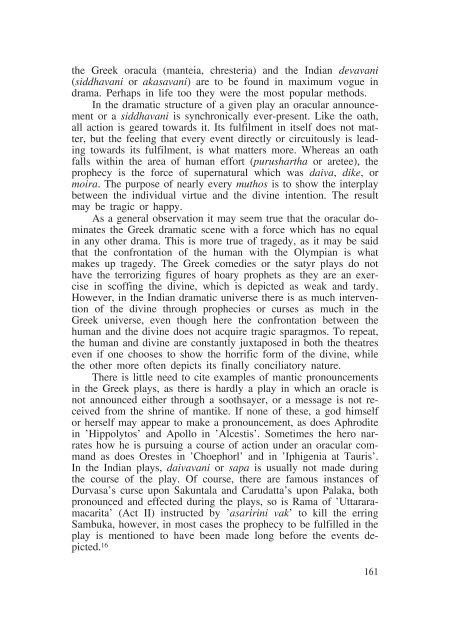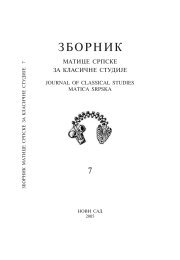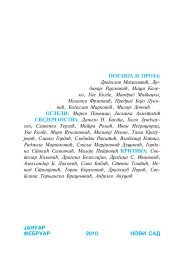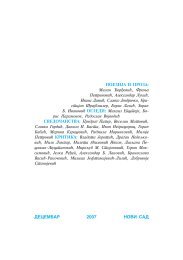Create successful ePaper yourself
Turn your PDF publications into a flip-book with our unique Google optimized e-Paper software.
the Greek oracula (manteia, chresteria) and the Indian devavani<br />
(siddhavani or akasavani) are to be found in maximum vogue in<br />
drama. Perhaps in life too they were the most popular methods.<br />
In the dramatic structure of a given play an oracular announcement<br />
or a siddhavani is synchronically ever-present. Like the oath,<br />
all action is geared towards it. Its fulfilment in itself does not matter,<br />
but the feeling that every event directly or circuitously is leading<br />
towards its fulfilment, is what matters more. Whereas an oath<br />
falls within the area of human effort (purushartha or aretee), the<br />
prophecy is the force of supernatural which was daiva, dike, or<br />
moira. The purpose of nearly every muthos is to show the interplay<br />
between the individual virtue and the divine intention. The result<br />
may be tragic or happy.<br />
As a general observation it may seem true that the oracular dominates<br />
the Greek dramatic scene with a force which has no equal<br />
in any other drama. This is more true of tragedy, as it may be said<br />
that the confrontation of the human with the Olympian is what<br />
makes up tragedy. The Greek comedies or the satyr plays do not<br />
have the terrorizing figures of hoary prophets as they are an exercise<br />
in scoffing the divine, which is depicted as weak and tardy.<br />
However, in the Indian dramatic universe there is as much intervention<br />
of the divine through prophecies or curses as much in the<br />
Greek universe, even though here the confrontation between the<br />
human and the divine does not acquire tragic sparagmos. To repeat,<br />
the human and divine are constantly juxtaposed in both the theatres<br />
even if one chooses to show the horrific form of the divine, while<br />
the other more often depicts its finally conciliatory nature.<br />
There is little need to cite examples of mantic pronouncements<br />
in the Greek plays, as there is hardly a play in which an oracle is<br />
not announced either through a soothsayer, or a message is not received<br />
from the shrine of mantike. If none of these, a god himself<br />
or herself may appear to make a pronouncement, as does Aphrodite<br />
in 'Hippolytos' and Apollo in 'Alcestis'. Sometimes the hero narrates<br />
how he is pursuing a course of action under an oracular command<br />
as does Orestes in 'Choephorl' and in 'Iphigenia at Tauris'.<br />
In the Indian plays, daivavani or sapa is usually not made during<br />
the course of the play. Of course, there are famous instances of<br />
Durvasa's curse upon Sakuntala and Carudatta's upon Palaka, both<br />
pronounced and effected during the plays, so is Rama of 'Uttararamacarita'<br />
(Act II) instructed by 'asaririni vak' to kill the erring<br />
Sambuka, however, in most cases the prophecy to be fulfilled in the<br />
play is mentioned to have been made long before the events depicted.<br />
16<br />
161

















